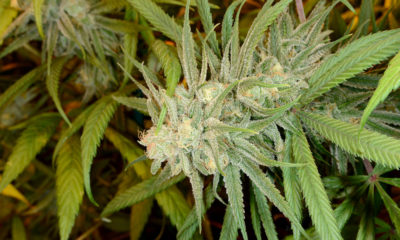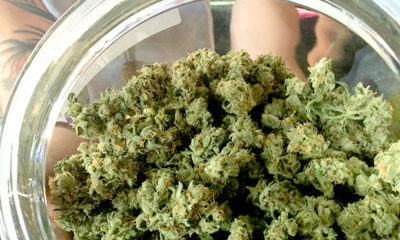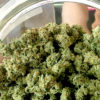Medical
Patients In Non-Medical States Likely Smoking Mold or Pest Covered Marijuana
Photo courtesy of Quick Trading Company
It’s not a secret and it no longer holds shock value; people buy, grow and smoke marijuana everywhere– medically and recreationally– even in states where it is not legal. Some smoke for recreational fun, some for medical necessity, and some for all of the above. A problem for consumers, however, lies in the places where it still isn’t legal and its sale goes unregulated on the black market.
Outdoor producers in legal states, such as California, often export the moldy or pest-covered bud they can’t sell at dispensaries to non-legal states, where they can still fetch a decent market price despite the quality.
Patients in non-medical states are at risk of purchasing low-quality cannabis, often times containing mold or pests. Facilities in legal states where marijuana is cultivated and sold legally have regulations set up for lab testing, disposal, maintenance and storage.
According to Spark Report, “Anyone who has smoked marijuana more than a couple times has most likely inhaled mold spores from marijuana.”
Because it’s such a common toxin, mold isn’t a huge issue for the average recreational toker because their immune systems can handle it. However, people who are smoking for medical purposes have reason to be slightly alarmed, especially if they suffer from conditions that compromise their immune systems.
In section R406; B12 of the Colorado Department of Revenue’s Marijuana Enforcement division, “Retail Marijuana or Retail Marijuana Product that can support the rapid growth of undesirable microorganisms shall be held in a manner that prevents the growth of these microorganisms.”
Specifically, this means jars can’t be completely airtight—a manner which is conducive to the growth of toxins, microorganisms, bugs and fungi. Due to the known dangers of said microorganisms, legal states have very specific procedures for the safety of their consumers. In order to export cannabis to illegal states, most transporters will seal their product in an airtight container to avoid smells. Moreover, in order to feel safe in their own homes, consumers also tend to also keep their product in airtight containers.
Because marijuana is still federally illegal, the FDA doesn’t even step in to keep legal states safe.
In an interview with NBC News, Randy Simmons, the Washington State Liquor Control board project manager in charge of implementing Washington’s legalization law, “It’s important for us to do it because it’s public safety and there’s no U.S. FDA oversight here. Things that would be FDA rules don’t exist.”
Let that sink in. “It’s public safety… Rules don’t exist.”
The government does step in to make sure that our cabbage, broccoli and tobacco are held to these standards.
Patients purchasing marijuana in illegal states should be on the lookout for mold spores and pests. They should also open their containers, to allow airflow, a few times a day and avoid using orange/citrus peels in to keep the stash moist, a common practice. If you’re going to keep your green in a potentially dangerous environment, it is recommended that you bake your bud. Heat your oven to 300 degrees and bake for about 15 minutes; this will help kill the concerning mold.
Beatrice* illegally smokes marijuana in a non-medical state, for a serious medical condition and has strong feelings about the lack of regulation in her state. “It’s bullshit. We already have health problems. Let’s just add a little more to the mix. I don’t want to be making myself sicker. You have to start wondering if you’re adding to the problem. It would be like taking dirty anti-depressants; it wouldn’t help. You need people who know the business, know the plant, not just Johnny Pot-Head trying to make a buck. The only solution is legalization.”























